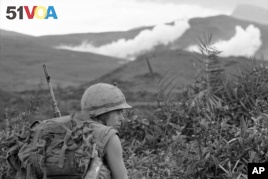April 30,2014
Today, April 30, marks the anniversary of the end of the Vietnam War. On this date in 1975, Marines evacuated the last Americans from the embassy in Saigon, bringing to a close America’s most divisive foreign conflict - a division expressed in street protests and in song.
The Vietnam War took place at an unusual time in United States history. A record number of U.S. women gave birth in the years 1946 to 1959, and the largest part of that “Baby Boom” was of fighting age when the war began. The “Baby Boomers” had also created a full-fledged youth culture by that time, a culture based largely on music. So when public sentiment turned against the war, so did popular songs.
America’s involvement in Vietnam started slowly - only 5,000 soldiers in 1960. So at first, people in the U.S. weren’t paying very close attention. But the protest movement was starting even then.
Within two years of the 1963 song, "Soldier’s Letter,” the number of Americans in Vietnam would increase dramatically. America didn’t have an all-volunteer army back then. In 1962 the government implemented the Selective Service, or “The Draft.”
“When you registered for the selective service system, you were assigned a draft number. And if your number came up, then you were in the Army,” said Leslie Waffen, the retired head of the motion picture, sound, and video branch at the National Archives and also an expert on the music of the Vietnam War.
“'Draft Dodger Rag’ was a very important, influential song. And it was recorded by many folk singers and groups. And the lyrics were filled with ways to dodge the draft,” Waffen added.
Draft dodging songs, like "Draft Dodger Rag" or David Crosby’s “Draft Morning,” mostly talked about the unfairness of the draft.

A U.S. Marine pinned down by sniper fire, looks back to check on his buddies as white phosphorous artillery rounds mark major Viet Cong position, action took place 15 miles south, southwest of Da Nang, Jan. 29, 1967.
“The ‘Fortunate Son’ song had several lines in it that referred to privileged youth who are able to avoid the draft and not have to participate in the war,” Waffen said
The president and the generals in Vietnam told Americans back home that the U.S. was winning the war. But in January 1968, North Vietnamese soldiers attacked positions deep inside South Vietnam, including the U.S. embassy. Though the offensive was soon crushed, it left Americans doubting what they were being told.
The song, “Fixin’ To Die Rag,” was performed by Country Joe and the Fish at Woodstock, a giant music festival that was held in upstate New York in 1969. According to Les Waffen, “it became extremely popular as a song that said everything about the public’s antagonism against the war and it sort of reflected what public opinion was all about.”
Even more important, Waffen says: The song also became popular with the soldiers who were fighting in Vietnam.
“There would be DJs in certain zones who would set up their own radio station and begin to broadcast the songs that you were not going to hear on Armed Forces Radio,” he said.
Of course there were also songs in favor of the war. In 1965 and 1966 the most popular song in America was “The Ballad of the Green Berets.”
And those celebrating soldiers also sang songs mocking those who found ways not to have to fight, as in "The Yellow Beret" by Bob Seeger.
America is a place of diverse opinions. It’s also a place that offers citizens the right to express those opinions -- even when they go against the government, even in the middle of a war.